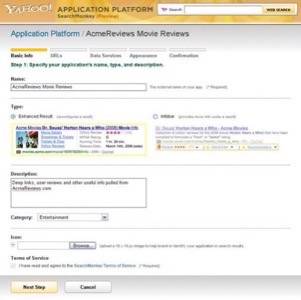Paul Miller reports that Yahoo! is today opening up its open developer platform for search SearchMonkey. SearchMonkey, which we reported on at the Web 2.0 Expo, is a component of a major overhaul at Yahoo! across all of its properties to “rewire” for the social graph and data portability. SearchMonkey allows developers to build applications for Yahoo! search “that enhance the usefulness and relevance of search results,” according to Amit Kumar, Product Manager for Yahoo! Search.

“With SearchMonkey, developers have a hand in shaping the next generation of search by building customized search results and mash-ups that users can add to their Yahoo! Search experience,” said Kumar.
The SearchMonkey platform has three main components, according to Yahoo!:
- “Site owners share structured data with Yahoo!, using semantic markup (microformats, RDF), standardized XML feeds, APIs (OpenSearch or other web services), and page extraction.
- Third party developers build SearchMonkey applications.
- Consumers customize their search experience.”
SearchMonkey applications come in two flavors: Enhanced Results and Infobars — though both theoretically enhance search results. Apps are triggered when organic search results include a specific URL. Enhanced results replace a normal search result and must include information only from the site referred to in the actual result. Infobars, which appear directly below results, can include links to other resources or calls for user action.

For example, if you owned a Lebron James fan site, you could create an Enhanced Result that replaced instances of results from your site with a box showing James’ latest stats and news articles pulled from structured data on your site.
Yahoo! Developer Network today released a quick guide to adding Microformats to your site. Indexing Microformats, and then further sweetening the pot by allowing developers to create applications that use that structured data and enhance the actual search results, should help push the use of semantic markup across the web. Besides potentially creating a better user experience via search results widgets, by incentivizing the use of semantic markup Yahoo!’s new open developer platform will help get us to a world where the bottom-up approach to the Semantic Web is feasible.
Yahoo! is also hosting a SearchMonkey Developer Challenge with $10,000 in prizes going to winners in 4 categories: Best Enhanced Result, Best Infobar, Most Innovative Use of Structured Data, Best Data Service, and Grand Prize (best over all categories).

















